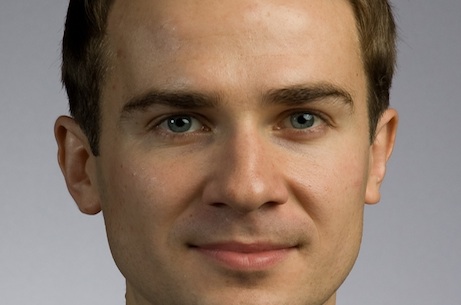
Bart Szewczyk has been named one of the 99 most influential foreign policy leaders under 33 by The Diplomatic Courier and Young Professionals in Foreign Policy.
Bart Szewczyk’s work in international law has been recognised by the prestigious magazine The Diplomatic Courier and Young Professionals in Foreign Policy which have named him one of the 99 most influential foreign policy leaders under 33.
Bart [2001], who is in his second year of a fellowship at Columbia Law School, has been researching a range of legal issues relating to US foreign policy and the European Union, but his career path could have taken a very different tack but for his time at the University of Cambridge.
Bart was born in Warsaw, but moved to New Jersey when he was 10 to stay with his stepmother and father, whose banking job had transferred there. His mother, a judge, passed away the following year in Poland and the move for Bart and his brother became permanent. Throughout his school years Bart maintained his knowledge of Polish history and language by attending a Polish school in Brooklyn every Saturday in addition to attending public school in New Jersey.
At high school he was a top student, but his school only offered one advanced placement course in chemistry. So Bart, who was always curious and self-motivated, decided to tutor himself through around 10 other advanced placement exams by buying and studying books geared to them.
A passion for foreign affairs
He intended to pursue a career in finance when he started his economics course at the University of Pennsylvania, but his heart was always in foreign affairs. He says it was his time at the University of Cambridge which opened his mind to other possibilities.
He chose to apply to Cambridge because one of his undergraduate professors had taught modern European history at the university and advised him to broaden his horizons. He was graduating a year early because his advanced placement exams in high school exempted him from some of his undergraduate courses. The professor told him that having that year in hand gave him the perfect opportunity to try something different. “He said why not take that year and go to Cambridge and explore some of my other intellectual interests,” says Bart. He had an offer from Goldman Sachs, but was able to defer it. It was a decision that transformed his career path.
He applied to Cambridge in 2000 before the Gates Cambridge Scholarship had been announced and was accepted on a Thouron Fellowship from the University of Pennsylvania. But once the news of the Gates Cambridge Scholarship was released, he opted to try for that and was accepted, receiving the news in the parking lot of a mail sorting facility after his acceptance letter got lost in the postal system. He says the first year of the scholarship was “fantastic”. “We were figuring out what the scholarship would look like and how to shape it,” he says.
International law
As part of his MPhil in International Relations, Bart did a course in international law. The experience led to a radical change of plans. “Cambridge encouraged me to explore various areas of knowledge and enabled me to interact with people studying a range of different disciplines,” he says. Instead of going to Goldman Sachs, he signed up for Yale Law School and a Masters in Public Affairs at Princeton which, true to form, he completed in four years rather than five. He says the courses gave him time to consider whether he wanted to be a lawyer or work in public policy. He discovered he very much enjoyed the practice of law. “I saw it as a useful and effective instrument of social change,” he says.
This view was backed up by a series of internships during his courses. In his first year, he was a clerk in the Federal Reserve Bank of New York [the bank with the largest gold reserve in the world] and worked for Judge Theodor Meron, the president of the International Criminal Tribunal for the Former Yugoslavia in The Hague. He also worked as a summer associate at Wilmer Cutler Pickering Hale & Dorr in Washington DC, and interned at the Pentagon in the Office of European and NATO Policy. After graduating from Yale and Princeton, Bart clerked for Judge Leonard Garth at the US Court of Appeals for the Third Circuit on cases ranging from torture to immigration. “He is an amazing figure who had met Franklin Roosevelt and served in North Africa with the US Army,” says Bart. “I got to learn a lot from him.“
In 2008 he clerked at the International Court of Justice in The Hague, which was dealing at the time with Georgia’s dispute with Russia over Abkhazia and South Ossetia. After returning to the US, Bart worked for three years at WilmerHale,combining his 80-90 hour a week job initially with a part-time PhD at Cambridge, and in his last year, with being an adjunct professor at George Washington School of Law.
He so enjoyed teaching that he decided to take the academic path full time at Columbia Law School. He says: “It was good to get valuable experience in private practice, but it came to a point where I needed to decide if I wanted to stay long term in private practice or turn to academia. And my heart was in research and teaching,” he says.
His main focus is international law and US foreign relations. At the end of last year, he won the Myres S. McDougal Prize for an article on the European Union entitled “European Citizenship and National Democracy: Contemporary Sources of Legitimacy of the European Union” in which he focused on the EU’s qualified majority voting system. The essay was based on his PhD work. Part of his interest in the EU, he says, was due to the debate around Poland’s entry to the Union, which was big news during his time at Cambridge.
He is currently researching customary international law in US courts and the political branches. “It is good to explore the underlying theoretical questions behind substantive policy questions,” he says.












